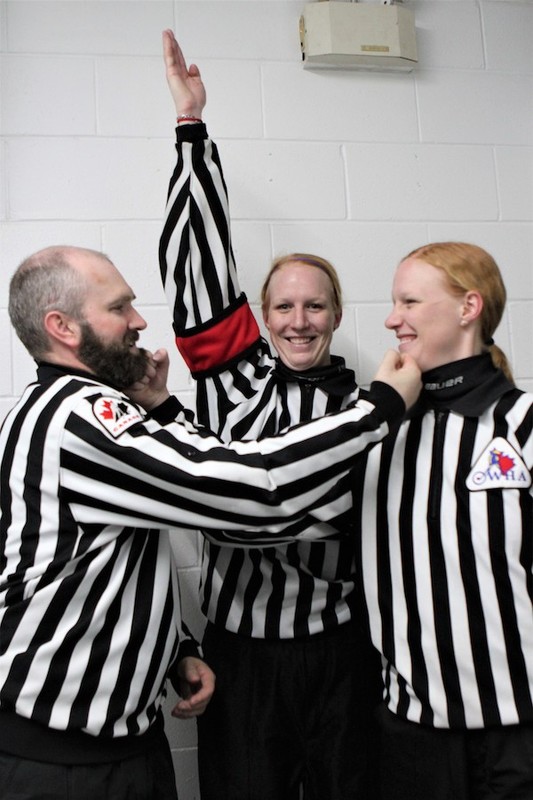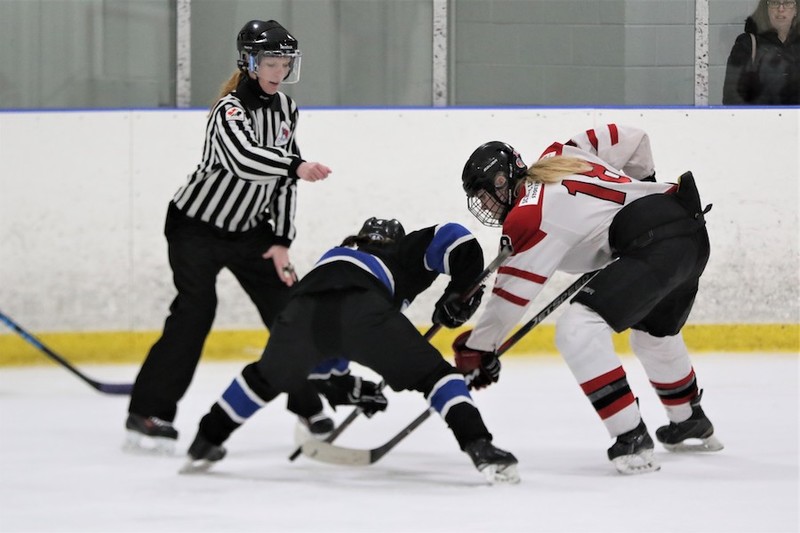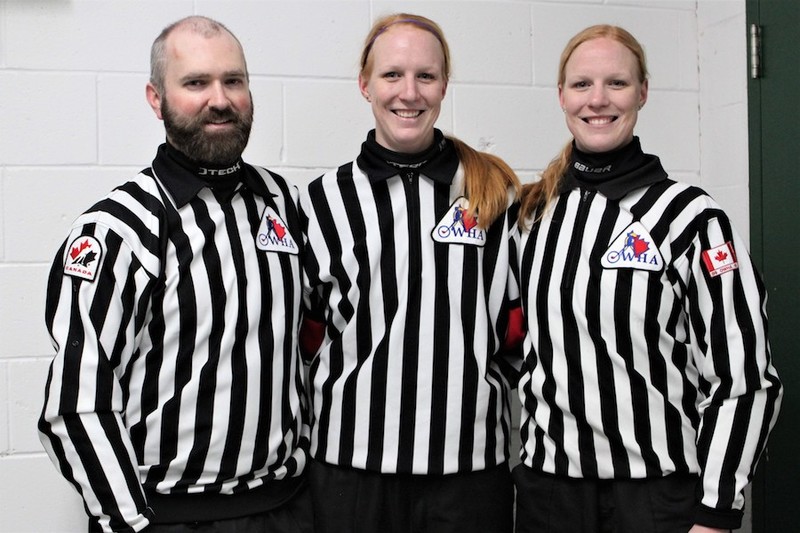Cassidy & Courtney - Two sisters who love hockey and love being on ice hockey officials

For the love of the game
Meet Cassidy Wade and Courtney Ganz. Ice hockey officials and twin sisters who are focused on being the best at their craft. For more than eleven years, both have pulled on their equipment and striped jerseys and officiated hundreds of girls and boys ice hockey games across the Greater Toronto Area. Initially introduced to the game as minor hockey players, both gals also grew up watching their father officiate games in the Ontario Minor Hockey Association (OMHA). As they progressed in their hockey careers and realized that they could only go so far as players, both Courtney and Cassidy thought that officiating hockey could be a great way to stay involved in the game they loved. And, make a little money at the same time.
In 2007, they both began their officiating careers. First officiating the earliest Ontario Women's Hockey Association (OWHA) games for the youngest players. Then, in the 2010/2011 season, they made the crossover to the OMHA and boys minor hockey. Today, they continue to referee both OWHA and OMHA games.

Officiating hockey - A family affair in multiple ways
We sat down with Cassidy and Courtney at the Westwood Arena in Brampton after both had refereed two OWHA games - one a Midget A game between the Windsor Wildcats and Brampton 265 along with a Midget BB game between the Markham Stouffville Stars and the Clearview Ice Cats - for the Lower Lakes female hockey league. In the Midget A game, Courtney was the referee and Cassidy was a linesman while in the Midget BB game, their roles were switched. In both games, Cassidy's husband Paul, who is also both an OWHA and an OMHA official, completed the trio of officials overseeing both of these games. The family connections to hockey officiating have extended beyond their father to now include Paul. Originally a long-time fellow official with Cassidy's father, Paul and Cassidy met while officiating a local Clarington Minor Hockey Association house league game. Paul had just moved to the Clarington, Ontario area and the place where both Cassidy and Courtney had grown up. The rest they say, is history.

More inspiring SWSCD stories of women embracing leadership roles in the world of sport:
McColl Sisters Make Their Debut As OWHA Referees
Radio Western - Helping women see themselves in the world of sport broadcasting
CYGHA Coach Tayler Gorman Leads With Passion and Confidence
In their own words: Courtney Ganz (CG) & Cassidy Wade (CW)
SWSCD: What are your thoughts on getting more women involved in officiating hockey?
CG & CW: It definitely helped that we had a parent who officiated. It opened our eyes to the world of officiating and it being a possibility or consideration as a job. It's important for both girls and boys to see female referees. For the girls, it's important to show them that being a referee is definitely a real option for them. For the boys, it teaches them that women can do the same things as men.
The challenge is that there just aren't a lot of female officials or referees relatively speaking. There are also misconceptions people have around female officials. Consequently, often people don't see women having enough authority to be able to officiate. Whether or not it's their judgement when making tough calls, having a sufficient amount of knowledge of the game or even if they will be too sensitive to handle any of the criticism they receive to the calls they make. Such scrutiny can be further magnified as referees and their calls are already often under the microscope by players, coaches, parents, and fans in the stands. For us, we stand firmly on the eleven years of experience we have as hockey officials. It definitely helps us to be confident in our skills and our ability to be good at what we do.

SWSCD: What do you think needs to be done to help the females who are hockey officials stay in the game over the long run?
CG & CW: For us, our experience is that we're not only some of the first female officials in our local area of Clarington, but we're also two female officials who have lasted the longest. It definitely can be a struggle to keep women in their positions as officials over the long term. Female referees tend to be picked on a little more than their male counterparts. Ninety-nine percent of the time the anger and shouting (of coaches, parents and fans, etc) that happens if there are questionable calls, ends when the game is over. It doesn't get carried off the ice. So it's really important that female officials not take the 'trash talking' they receive while on the ice personally or to heart.
It's also important that new referees (women and men) have access, on and off the ice, to mentors and experienced referees to talk to and bounce ideas off of. We're fortunate because we have direct access to the extensive experiences of our father as a long-time official. Sometimes when the only person you can go to with a question/comment/concern is also your boss or supervisor, it can be intimidating or you may not want them to think you are incapable. This is why if newer referees have mentors available to guide them, they might feel more comfortable asking questions and voicing their concerns.

SWSCD: What do you think are three key skills that are essential to have as a referee?
CW: You definitely have to have confidence in yourself and your knowledge of the game. But you also need to be able to recognize that you will make mistakes and that's okay. You just need to be able to openly admit when you're in the wrong. It's also important to be a good skater.
CG: I think game management is important. That is, what to call and what not to call. Think of it like having a bird in your hands. Squeeze it too hard and it will die. Don't hold it tight enough and it will be able to fly away. You need to be able to find that happy medium. I also think it's important that you have confidence in yourself as well as in your partners and co-workers. This kind of trust in yourself and with the others you'll work with will help make the games run more smoothly.
CG & CW: The job of an official is not for everyone. It takes a lot of patience and also requires that you have the ability to identify when a situation has escalated too far. It's important that you learn how to decide when to let something go versus when you need to make the call. It's definitely crucial to know how to set and maintain boundaries. (Eg. "I don't care if you're thirty years older than me, you can't talk to anyone that way.")

SWSCD: Both of you referee in both the OWHA (women) and the OMHA (men). Have you noticed differences between both of these hockey associations in terms of the experiences you've had as referee?
CG & CW: The OMHA tends to have and make more resources, training and supervisors available for their referees. There are also different ways that we are able to progress as referees in each of the associations. We would love to see more of the resources and training that's available for referees through the OMHA made more available and accessible through the OWHA.

SWSCD: What kinds of responses do you see from the boys versus the girls when they see you officiating their games?
CG: I find the girls respect you. They treat you like any other referee and it's not really a big deal to them. Coaches of female teams give a similar response to the female players. Although, interestingly, in the scenerio where there is also a male referee (maybe a bigger, older man), coaches and players tend to be more inclinded to talk to him regarding issues as opposed to the female referees.
I do find that the boys are more likely to question the capability of female referees based on their gender. In one particular instance where our crew was one of five selected to referee a peewee (age 12 years) championships, right off the bat I heard from a player "there's a girl ref". Later in the same game and after I had called a couple of penalties, this same player also made the comment "you're good!". Although there was no intent to be mean spirited, I think this example shows that the player was both surprised that a woman would be doing this job and had assumed that I wouldn't be a good referee.
The good thing is that the other officials we work with see us just as an official and not as a 'female official'. They've also given us the chance to officiate important games that have a lot on the line and that also helps to show us that our superiors appreciate the skills that we have to call a good game.

CW: I would agree with Courtney that the girls definitely treat you like you're one of them. I do think players opinions towards us will often depend on the coach of the team. I've experienced lots of different things in situations where the referee of the game was female and the linesman was male. During one particular game, the male coach of a team approached the linesman rather than the referee regarding a penalty call simply because he valued the opinions of a man over a women. When the coach was told by the linesman that this issue should be taken up with the referee, the coach decided he'd rather not discuss the issues at all than discuss it with the female referee.
At the end of the day, though, it's important to understand that being a referee is a profession where people are going to dislike you, regardless of whether or not you make mistakes. A good coach, female and male, will set the tone for their team and teach them how to respect all referees. When I first started officiating male leagues, the boys/men were wary of a female referee being 'in a man's world'. But it's like diving into the deep end and you just need to hope that the players/coaches appreciate and respect you for how well you do your job. More importantly, you have to focus on doing your job of making the calls and not take things to heart when people make side comments about the calls you're making.

SWSCD: Let's switch gears a bit. What kind of equipment do you wear as an official?
CG & CW:
1. Shin pads - There are referee-specific shin pads available but player shin pads do just fine as well.
2. Elbow pads
3. Neck guard - They are required by leagues for both players and officials. We like to wear neck guards that are attached to our shirts.
4. Helmet and visor
5. Whistle on hand - Some people use tape on their hands to enable smoother movement of the whistle.
6. Referee stripe shirts and pants - Both can be found at many sporting goods stores as well as online from referee-specific retailers.

SWSCD: Finally, what's it like having the opportunity to referee games together?
CG & CW:
It's great. As sisters, we work well together because we know each other really well. This deep mutual understanding of each other is super helpful especially when we're facing a lot of yelling and angry comments during a particularly challenging game. It's nice because we know how to support each other in these tough moments. We've also had the chance to be a part of a full family officials crew where all four of us (Courtney, Cassidy, their father and Cassidy's husband Paul) have officiated games together. That's been a lot fun to do too.

SeeWhatSheCanDo
Find the Ontario Women's Hockey Association (OWHA) and the Ontario Minor Hockey Association (OMHA) in our Athlete Advisor, your online athletic business directory. Find, rate and review programs, local community offerings and businesses that will help you do your thing.
Post your upcoming ice hockey event in our SWSCD Hub. Start a pick up ice hockey group in our SWSCD Hub.
Look for advice, stories, news and more on our Ice Hockey activity page.
Share your own ice hockey moments directly on our Discover blog or by using #seewhatshecando on social media and inspire others to get active.











Comments